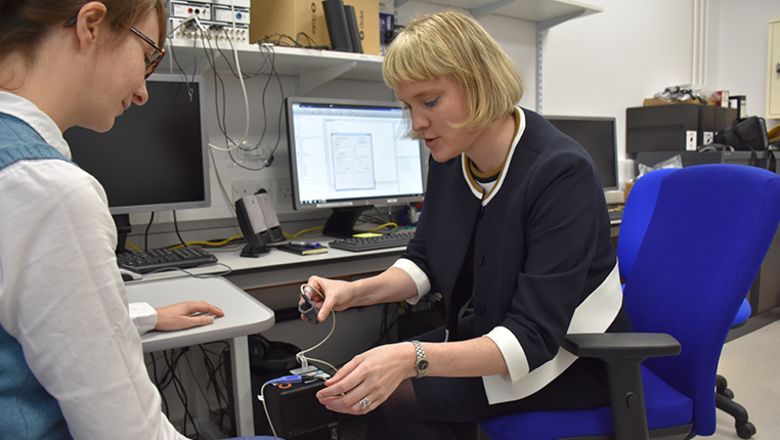Do natural variations in hormones, such as oestrogen, make anxiety disorders more likely? If so does this affect the way people respond to treatment?

A novel targeted treatment for reducing anxiety in joint hypermobility: a proof of concept study
Dr Jessica Eccles is creating and testing a new therapy to treat anxiety in people with hypermobility.
The project
Research has shown that our perception of our body’s functions, like our heart rate, affects our emotions.
In general, we feel more anxious when we think our heart is racing. Faster heartbeats occur in fear responses controlled by the ‘fight or flight’ nervous system.
A fifth of the population have hypermobility, where joints move beyond a normal range of motion. The experience of anxiety is greater and more frequent in people living with this condition than in the general population.
Dr Jessica Eccles can explain this increase in anxiety by the fact that people with hypermobility are more sensitive to bodily feelings, such as changes in sensations like heart rate. People with hypermobility may also be more likely to experience faster heart beats because of a more reactive ‘fight or flight’ nervous system, which may be related to a condition called Postural Tachycardia Syndrome.
The link between hypermobility and anxiety has been recognised for some years, but no specific targeted treatments are available at present.
Jessica is developing and testing an intervention aimed at reducing anxiety in people with hypermobility.
The process
Jessica will conduct a randomised controlled trial of a new therapy that aims to directly target anxiety in hypermobility.
To see if her intervention works, Jessica will run a pilot trial with 80 people living with anxiety and hypermobility. 40 people will be given the new therapy and 40 will be given a more standard treatment for anxiety. This trial will enable Jessica to test how effective the new therapy is, compared to what is already available.
Jessica will also invite some of the people on this therapy trial to come for brain scans. These additional tests will help us understand how the therapy works and the ways it could be improved.
The potential
Hypermobility affects a staggering 20% of the population. Anxiety is generally very common, but is really common among this group of people with hypermobility.
This therapy offers the chance to create and test a new anxiety treatment. The study will help improve ways of relieving the debilitating symptoms of anxiety. In a particularly vulnerable group of people offer new insight into the processes that link anxiety to bodily feelings.
This project is jointly funded with Arthritis Research UK.

Dr Jessica Eccles is an academic clinical lecturer at Brighton and Sussex Medical School. Her main areas of expertise are brain-body interactions, joint hypermobility and liaison psychiatry.
Was this information helpful?
Related research profiles
Sensitive periods for the effects of depression on suicide risk: a longitudinal study of gene-environment interactions and epigenetic mechanisms
Dr Lussier aims to determine the extent to which child and adolescent depression interacts with genetic susceptibility to influence suicide risk in early adulthood.
Increasing access to social prescribing for people living with severe mental illnesses at risk of cardiovascular disease
People with severe mental illnesses are at high risk of heart disease due to lack of physical activity and social isolation. Social prescribing can help, but is it accessible?


